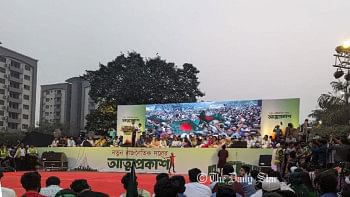DIFE, other regulators draw flak for failure
A noted economist yesterday raised a question about the performance of the government's factory inspection agency and other regulators in the industrial sector after yet another deadly accident shook the country.
Rehman Sobhan, chairman of the Centre for Policy Dialogue (CPD), questioned why the Department of Inspection for Factories and Establishments (DIFE) could not show substantial performance even after seven years of the Rana Plaza building collapse.
"Obviously, there has been a limitation in the capacity of the DIFE to discharge its responsibility. I am not sure why that should be the case eight years after the Rana Plaza and all the initiatives that have been taken."
This should have been the priority sector of the government, the capacity of the DIFE should have been substantially upgraded, and the recruitment and the training process should have been substantially enhanced, he said.
This might not have been done for some reason, and how far the DIFE had been able to perform its duty effectively, therefore, always remained in the state of tension because of the demands of the job.
"We need to address and see how the regulatory agencies are doing their job. What we need an oversight mechanism on the government regulatory agencies, including the DIFE, to see how effectively they are doing their job."
Prof Sobhan called for a series of reports on how the DIFE and other oversight agencies in the industrial sector were carrying out their duties.
"I think here we would get some very disturbing information if an effective oversight mechanism is put in place. Hopefully, it will then lead to considerable attempts to improve the situation."
"We have to keep in mind the problem is nationwide and economy-wide."
The economist was speaking at a virtual dialogue on "Industrial Safety of the RMG Sector during the Post-Accord-Alliance Period", jointly organised by the CPD and German non-profit organisation Friedrich-Ebert-Stiftung (FES).
His comments came as a factory fire at Hashem Foods Ltd at Rupganj in Narayanganj on Thursday left at least 52 workers dead.
Weak safety in the non-RMG sector was exposed at the Hashem Foods factory fire, Prof Sobhan said.
He lamented the lack of effective unions in each factory. Had there been a union in all factories, discussions would have been possible with the workers on improving living conditions.
"The workers are going to workplaces with health risks and under pressure because of the lack of unions," he said.
For instance, before the Rana Plaza collapsed, the workers were compelled to go to their work despite the development of cracks on factory walls.
"Regular consultation and engagements of workers with factories are needed by considering them as the partners of the factories," the economist also said.
Kalpona Akter, executive director of the Bangladesh Centre for Worker Solidarity, said many workers would not have died had the government's inspection had been carried out at factories.
"Moreover, the Accord and the Alliance would not have needed to come here."
Garment factory owners have strengthened the safety under pressure from international buyers, but the safety standard was poor at the juice factory at Rupganj as there was no such pressure, she said.
Buyers purchase clothing items at low prices on an excuse of poor safety conditions, she said.
While presenting the keynote paper, Khondaker Golam Moazzem, research director of the CPD, said 22.50 per cent of garment factories had been not inspected officially.
"Most disasters take place in the medium-scale factories," he said.
He said 93 per cent of factories had safety committees. If the committees could function, the number of industrial incidents might go down.
There are 89,974 registered factories, shops, companies and institutions and more than 4.4 lakh unregistered units in Bangladesh for the DIFE inspectors to inspect, according to Md Nasir Uddin Ahmed, inspector-general of the DIFE.
The number of approved posts at the DIFE is 993. Of them, 575 posts are for inspectors. But, the agency now employs 314 people.
"We have sought more workforce from the government to strengthen inspection," Ahmed said.
George Faller, in charge of the International Labour Organisation in Bangladesh, said safety culture in the garment industry had improved but the safety issue needed to be seen holistically.
"Although the safety in the garment industry is world-class, the safety in some factories should be looked at."
Syed Manzur Elahi, a member of the CPD Board of Trustees, said Bangladesh was able to improve the safety standard at the industrial units in 30 years, whereas other countries took 100 years.
"You can make a profit, but not at the cost of the lives of workers," he said, indicating to owners' attitude about safety.
Mohammad Hatem, first vice-president of the Bangladesh Knitwear Manufacturers and Exporters Association, said the garment sector had become the role model for safety after the remediation of factory buildings as per recommendations by the Accord and the Alliance, two foreign inspection agencies.

 For all latest news, follow The Daily Star's Google News channel.
For all latest news, follow The Daily Star's Google News channel. 



Comments